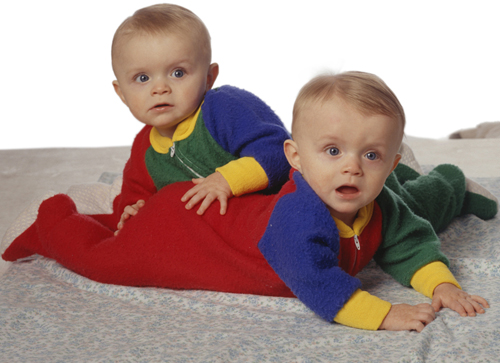Your 32nd Week
The baby has not
settled into her final birth position just yet, but an assessment of how
she’s lying will be made at every routine checkup. There’s still room
in the uterus for your baby to exercise her limbs and she’s getting much
stronger and more active. You’ll know all about it! As your belly gets
bigger, it may become more difficult to be very active and to get
comfortable when you’re sitting or lying down.
NOTE
Your midwife will be monitoring your baby’s position in the uterus
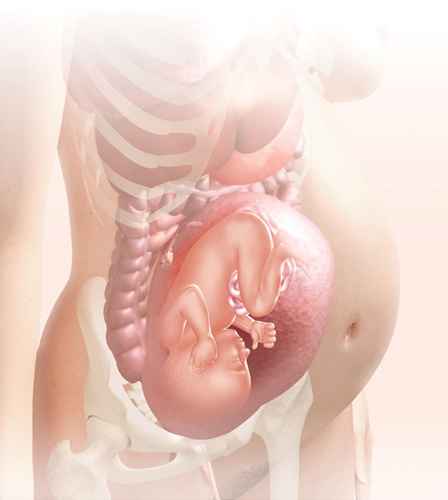
You are 31 Weeks and 1 Day 62 days to go…
If you listen to music while you’re pregnant, your baby will be tuning in, too—and it might just benefit her.
Your baby today
The amount of amniotic fluid within the uterus is at its maximum
over the next two weeks but will subsequently start to reduce
gradually. Measurements of the four deepest pockets of amniotic fluid
can add up to 6–8 in, allowing space for your baby to move.
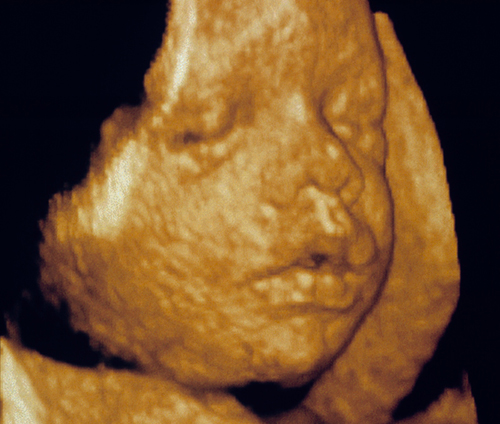
You might have noticed that your baby becomes more active
when you’re listening to music. It’s been noted that unborn babies move
and even breathe in time to music, and there have been claims that by
exposing your baby to certain types of music, you can enhance her brain
development.
One study, relating to a
“Baby Mozart” brain-enhancing product, claimed that the structure of,
say, a particular Mozart arrangement, stimulated brain development to a
greater extent than other genres, and even other classical composers.
This theory has, however, been debunked. Some research found that
college-aged students who listened to classical music showed a brief and
temporary improvement in spatial intelligence. However, the same
research was not tested in children or babies.
The research has not been repeated and the results are open to several different interpretations.
Whether or not it
enhances your baby’s intelligence, listening to classical music can
relax you, which is always a good thing during pregnancy. And if you
gently sway to the music, your baby may enjoy being “rocked” to sleep.
… Doctor
| Q: |
What exactly is an “active birth”?
|
| A: |
Having an “active birth”—staying mobile during the first stage
of labor and remaining upright, squatting, kneeling, or on all-fours
during the second stage—can make labor and delivery easier and less
painful. Working with gravity helps your pelvis to open and encourages
the baby’s head to press on your cervix, helping it to dilate. To get
active:
Practice squatting :
it takes time to learn to do it, but it’s an effective way to speed
labor up. When squatting, make sure you have sufficient support—from
your partner, for example. Relax by kneeling with a birth ball or beanbag. Use a birthing pool if you want to relax in water for a while. If you need an IV, because you’ve been induced , ask for one with a long tube that will leave you free to move around a little. Choose a walking epidural, which should enable you to stay active. If lying down makes your contractions stop, get up and start moving again.
|
… Your body
Protruding navel
You may be surprised to find
that by now your perfectly formed navel is protruding. This protrusion
is caused by the pressure of your rapidly expanding uterus, which
presses against your abdomen and literally pops your belly button out.
Some women find their
protruding navel unsightly, and choose to wear skirts or pants with a
high waistband to cover it; you can also cover your protruding belly
button with a Band-Aid.
A protruding navel is a
normal consequence of pregnancy and it will return to normal a few
months after the delivery. Although you may find that, like other parts
of your body, your navel sags a little more than it used to.
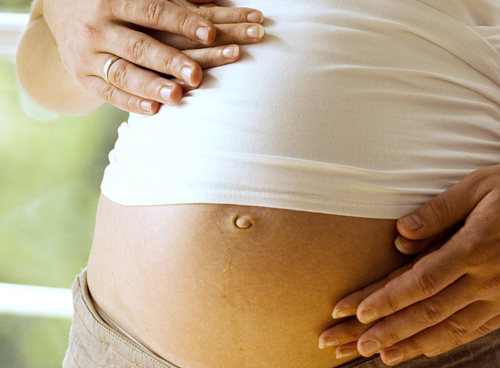
You are 31 Weeks and 2 Days 61 days to go…
By this stage, your baby is the length she’ll be at birth, but she’s still very thin and needs to gain fat and muscle.
Your baby today
Your baby’s hand coordination continues to improve as her brain
is better able to make sense of the feedback it receives. The eyes will
often open but only for short periods at a time, reducing the chance of a
stray finger coming too close.
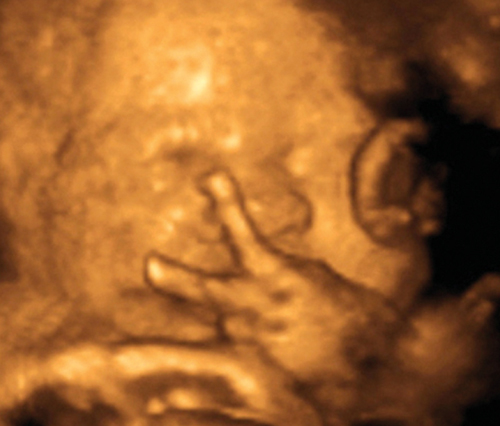
At this stage of pregnancy,
your baby’s muscle mass and fat are continuing to increase. Her skin is
now thicker and less translucent, and begins to look pink rather than
red as the underlying blood vessels are overlaid with more flesh. Growth
hormone is being produced by your baby’s pituitary gland but before
she’s actually born this does not influence her growth. Instead insulin
and insulin-like growth factors are key. As your baby’s skeleton is now
close to its final size, her overall length is established. Your baby is
still, however, very skinny.
A sonographer can make a
good estimate of your baby’s weight from an ultrasound scan but her
final birthweight will very much depend on when she is born. She’ll
continue to grow throughout the pregnancy, although in the last few
weeks growth is mainly due to fat deposits rather than to muscle mass.
If you’re trying to
guess how heavy your baby will be at birth, the latest research
indicates that the size of your baby has a lot to do with “imprinted”
genes. These are genes that are marked as having come from the father,
which promote the baby’s growth, or the mother, which are growth
limiting and attempt to preserve her resources.
… Twins
Dressing your babies
Twins look adorable when they’re dressed alike,
so you may be buying—and certainly will be given—lots of sets of
matching clothing. But it’s much easier to tell identical twins apart
when they’re dressed differently. It also helps everyone relate to them
as individuals, which is good for their development.
Also keep practicalities
in mind: every time one of your twins gets dirty, are you going to
change them both? You may find it pays to be flexible: if there are only
two clean onesies, then that is what they’ll have to wear, regardless
of style or color match. Newborns don’t care what they wear, but if you
get in the habit of dressing them the same, they may become conscious of
it in the toddler years and get distressed if they’re wearing something
different.
How you dress your babies is your decision, but you could:
Dress your babies in matching outfits but different colors, or the same colors but different styles.
Only dress them identically on certain occasions, for instance for a family photograph or special occasion.
Give any identical outfits you receive to one twin. The next batch of identical outfits goes to the other twin.
